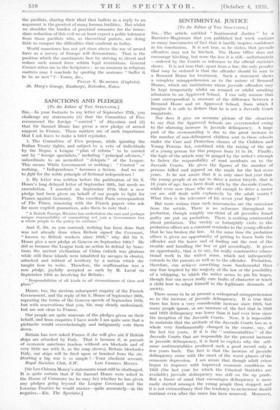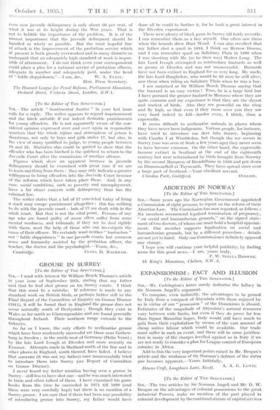SENTIMENTAL JUSTICE
[To the Editor of Tun 'SPECTATOR.] Sum,—The article entitled " Sentimental Justice " by a Barrister-Magistrate that you published last week contains so manyn inaccuracies of fact that it hardly inspires confidence in his conclusions. It is not true, as he states, that juvenile offenders may not be birched. The Home Office does not encourage birching, but none the less it is still-7unfortunately —ordered by the Courts as reference to the official statistics shows. It is not true that, apart from a fine, the only penalty that may be ordered is that the offender should be sent to a Remand Home for treatment. Such , a statement shows a complete misapprehension as to the nature of Remand Homes, which are institutions where juvenile offenders may be kept temporarily whilst on remand or whilst awaiting admission to an Approved School. I can only assume that your correspondent is unaware of the difference between a Remand Home and an Approved School, from which I imagine it is safe to deduce that he is not a Juvenile Court magistrate.
Nor does it give an accurate picture of the situation to say that the Approved Schools are overcrowded owing to the alarming increase in juvenile delinquency. A large part of the overcrowding is due to the great increase in the number of non-delinquent children sent to these schools under the Care and Protection clauses of the Children and Young Persons Act, combined with the raising of the age of a young person for this purpose from 15 to 16. Finally, the logic of the article may be gauged by the writer's attempt to fasten the responsibility of . road accidents on to the Juvenile Courts. He gives the figures of the number of persons killed and injured on .the roads for the last seven years. Is he not aware that it is only since last year that the young pee* of an age to drive a motor bicycle, that is 16 years of age, have been dealt with by the Juvenile Courts, whilst even now those who are old enough to drive a motor car are still dealt with e,cclusively by the adult courts ? What then is the relevance of his seven year figure ?
But more serious than such inaccuracies are the omissions from the article. There is no reference throughout to probation, though roughly one-third of all juveniles found guilty are put on probation. There is nothing sentimental about probation. The weekly or fortnightly visits to the probation officer are a constant reminder to the young offender that he has broken the law. At the same time the probation officer is given an opportunity of getting to know both the offender and the home and of finding out the root of the
trouble and handling the boy or girl accordingly. It gives an opportunity, that is to say, for really constructive educa-
tional work in the widest sense, which not infrequently
extends to the parents as well as to the offender. Probation, therefore, can achieve something more fundamental than
any fear inspired by the majesty of the law .or the possibility of a whipping, to which the writer seems to . pin his hopes, though fear can never really cure faults of character or teach a child how to adapt himself to the legitimate demands of society.
.There seems to be at present a widespread misapprehension as • to the increase of juvenile delinquency. It is true that there has been a very considerable increase since 1919, but many people ignore, or are unaware of, the fact that in 1923 and 1929 delinquency was lower than it had ever been since the inception of the Juvenile Courts. Now, it is impossible to maintain that the attitude of the Juvenile Courts has as a whole very fundamentally changed in the course, .say, of the last ten years. If it is the " sentimentalities " of the Juvenile Courts that are responsible for the present increase • in juvenile, delinquency, it is hard to explain why the self- same sentimentalities. produced such a good record only a few years back. The fact is that the increase of juvenile delinquency came with the onset of the worst phases of the economic depression. I am aware that though adult crime " began to improve with improved economic conditions in 1933 (the last year for which the Criminal Statistics are available) juvenile delinquency was still on the up grade. But a frame of mind that encourages delinquency is more easily started amongst the young people than stopped, and it is not extraordinary that the tendency to an increase should continue even after the cause has been removed. Moreover, even now juvenile delinquency is only about 60 per cent. of what it was at its height during the War years. That is • not to belittle the importance of the problem. It is of the Utmost importance that the juvenile delinquent should be handled as wisely as poSsible. • But the most hopeful line Of attack is the improvement of the probation service which at present is both grossly overworked and in many districts so underpaid that an adequately high standard of work is impos- sible of attainment. I do not think even your correspondent could place a plea for a national service of probation Officers, adequate in number and adequately paid, under the head of " futile sloppishness."—I am, &c., W. A. Ei.aux,' Hon. Press Secretary.
The Howard League for Penal Reform, Parliament Mansions, Orchard Street, Victoria Street, London, ;S.W.1.











































 Previous page
Previous page